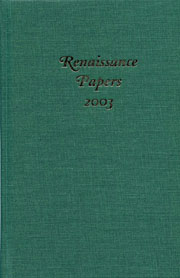Book contents
- Frontmatter
- Contents
- Renaissance Papers
- Homer, Erasmus, and the Problem of Strife
- William Tyndale Among the Demons
- The Printing of “this written book”: G.T. and H.W.'s Editorial Disputes in The Adventures of Master F.J.
- George Puttenham as Comedic Artificer
- Amoret and Scudamour Woo and Wed: Two Courtly Histories and a Stalemate
- Strange Bedfellows: “The Churching of Women” and The Taming of the Shrew
- “Romans, countrymen, and lovers”: Performing Politics, Sovereign Amity and Masculinity in Julius Caesar
- “Rouse Up a Brave Mind”: The Merchant of Venice and Social Uprising in the 1590s
- Revenge Tragedy and Elizabeth Cary's Mariam
- “very worthely sett in printe”: Writing the Virginia Company of London
Homer, Erasmus, and the Problem of Strife
Published online by Cambridge University Press: 12 September 2012
- Frontmatter
- Contents
- Renaissance Papers
- Homer, Erasmus, and the Problem of Strife
- William Tyndale Among the Demons
- The Printing of “this written book”: G.T. and H.W.'s Editorial Disputes in The Adventures of Master F.J.
- George Puttenham as Comedic Artificer
- Amoret and Scudamour Woo and Wed: Two Courtly Histories and a Stalemate
- Strange Bedfellows: “The Churching of Women” and The Taming of the Shrew
- “Romans, countrymen, and lovers”: Performing Politics, Sovereign Amity and Masculinity in Julius Caesar
- “Rouse Up a Brave Mind”: The Merchant of Venice and Social Uprising in the 1590s
- Revenge Tragedy and Elizabeth Cary's Mariam
- “very worthely sett in printe”: Writing the Virginia Company of London
Summary
In his 1518 Letter to the University of Oxford, Thomas More expresses his dismay at a quarrel which has recently erupted at Corpus Christi College, Oxford between supporters and opponents of the study of Greek, the latter faction led by the conservative Franciscan theologian Henry Standish. More complains in his letter that “certain scholars of your university, prompted either by hatred of Greek learning, by a misguided devotion to some other sort, or (as I think more likely) by a shameless addiction to joking and trifling [improba ludendi nugandique libidine], have formed a deliberate controversy to call themselves Trojans … for the sole purpose of jokingly setting themselves up as a faction opposed to the Greeks [factio graecis adversa] to make fun of the students of Greek learning.” One of a number of controversies that erupts in the second decade of the sixteenth century over the teaching of Greek and Hebrew, most notably the protracted quarrel between the Hebraic scholar Johannes Reuchlin and members of the faculty of theology at the University of Louvain, the quarrel between the “Trojan” Standish and his Greek adversaries is modeled upon that most famous of Hellenic contentions, the Trojan War—so much so that members of Standish's faction even assume the names of Trojan heroes, referring to themselves as Priam, Hector, and Paris.
- Type
- Chapter
- Information
- Renaissance Papers 2003 , pp. 1 - 32Publisher: Boydell & BrewerPrint publication year: 2004

